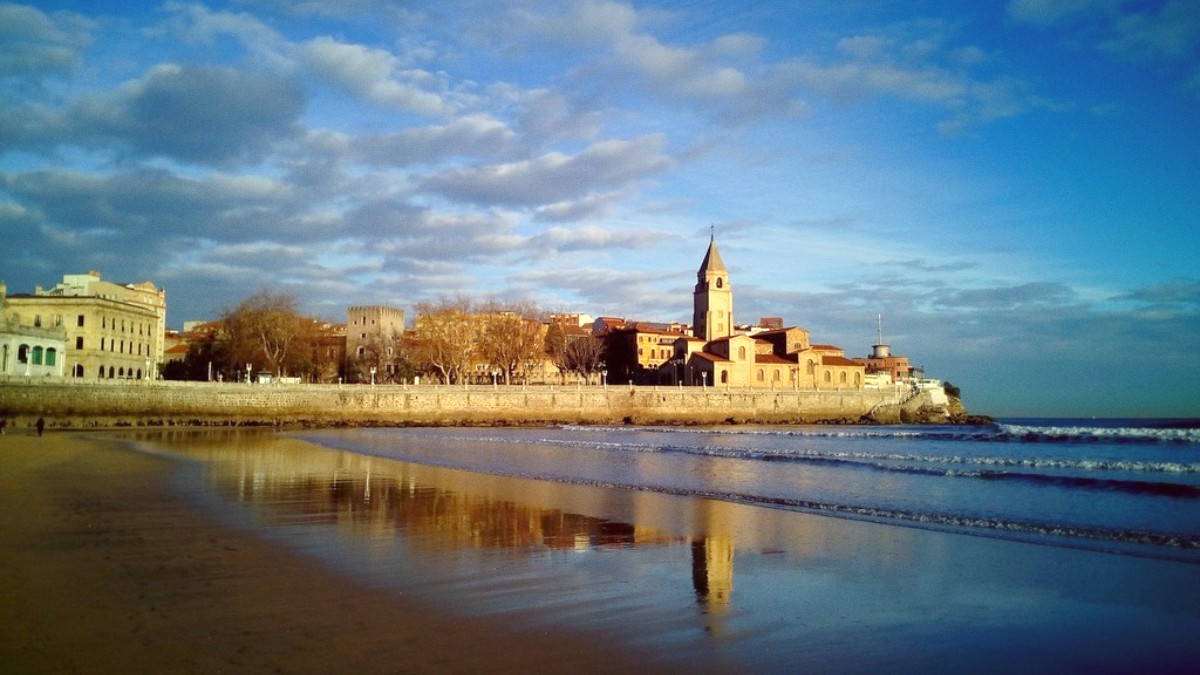
Asturias, Spain
Gijón's climate presents a temperate experience, avoiding the extreme heat or cold found in other parts of Spain.
Spring (March-May): Temperatures typically range from 10-15°C (50-59°F). Rainfall is moderate, and the landscape comes alive with blooming flowers. Days lengthen, allowing more time for outdoor activities.
Summer (June-August): This is the warmest period, with average temperatures between 18-22°C (64-72°F). Showers are possible. Humidity remains moderate, making for comfortable conditions, especially near the coast.
Autumn (September-November): Temperatures stay mild, averaging 12-18°C (54-64°F). This season presents a pleasant, cooler atmosphere.
Winter (December-February): Temperatures remain mild, typically between 8-12°C (46-54°F). Winter has the highest chance of rain. Occasional frosts occur, but snow within the city is rare.
Gijón does not experience extreme weather events like monsoons or hurricanes. The oceanic influence moderates temperatures, meaning very high or very low temperatures are rare. Summer heatwaves, while possible, are less common and less intense than those in inland Spain.
Pack layers for any season, as weather conditions can change, and evenings often cool down, especially near the coast.
July - August
Warmest weather ideal for beaches and water sports. All attractions and services operate at full capacity.
Most visitors, leading to larger crowds. Accommodation and flight prices reach their peak. Booking far in advance is a good practice.
May - June, September - October
Pleasant temperatures, significantly smaller crowds. Lower prices for accommodation and flights. Excellent for outdoor activities and cultural exploration.
Increased chance of rain compared to summer. Some coastal businesses may have reduced hours in late shoulder season (October).
November - April
Fewest crowds, quieter local experience. Lowest accommodation and flight prices. Good for exploring museums and gastronomy without queues.
Cooler temperatures, higher chance of rain. Some outdoor activities may be limited. Shorter daylight hours.
Spain is part of the Schengen Area, a group of 27 European countries that have abolished passport and all other types of border control at their mutual borders. This influences entry requirements for visitors.
EU/EEA/Swiss Citizens: No visa needed for entry. Valid national ID card or passport accepted.
US, Canadian, Australian, UK Citizens, and many others: No visa needed for stays up to 90 days within any 180-day period for tourism or business. Valid passport needed.
Other Nationalities: Likely require a Schengen visa. Application includes form, flight/accommodation proof, Travel insurance, and proof of funds. Biometric data usually needed at a Spanish embassy or consulate. Start well in advance, as processing times vary. For consumer visa application services, visit IVisa or VisaHQ.
Valid for at least 3 months beyond your departure date from Schengen Area. Issued within last 10 years, two blank pages.
Physical visa sticker in passport.
Evidence of planned departure (flight ticket, itinerary).
Copies of bookings or invitation letter.
Evidence of sufficient money for your stay (bank statements, credit card limits).
Gijón offers experiences across various price points, accommodating different travel styles. Currency is the Euro (€, EUR).
ATMs (Cajeros automáticos) are widely available and offer competitive exchange rates. Banks also offer currency exchange. Avoid airport exchange bureaus for large amounts due to less favorable rates.
Prices fluctuate based on season and demand. These are general ranges.
These strategies can further reduce your costs in Gijón.
Spain features good healthcare services and is generally a safe country for travelers.
Required Vaccinations: No specific vaccinations are mandatory for entry into Spain from most countries. Routine vaccinations should be current. This includes Measles-Mumps-Rubella (MMR), Diphtheria-Tetanus-Pertussis, Varicella (chickenpox), Polio, and your annual Flu shot.
Always consult a healthcare professional at least 4-6 weeks before your trip for personalized advice based on your medical history and travel plans.
The sun can be strong, especially during summer. Drink plenty of water throughout the day. Carry a Reusable water bottle.
Use Broad-spectrum sunscreen with high SPF.
Wear comfortable, supportive Walking shoes to prevent blisters.
Minor ailments like colds, stomach upset, or small cuts can occur. Gijón has a high standard for food hygiene. Tap water is safe to drink.
Carry a Basic first aid kit.
Wash market fruits/vegetables thoroughly.
Gijón is generally a safe city with low crime rates. Petty theft, mainly pickpocketing, can occur in crowded tourist areas or on public transport.
Keep valuables secure and out of sight. Consider Anti-theft bags.
Be aware of your surroundings, especially in crowded spots. Use an RFID blocking wallet.
| Coverage Type | Benefit | Recommendation |
|---|---|---|
| Medical Emergencies | Treatment and hospitalization. | Highly recommended for all travelers. World Nomads, SafetyWing. |
| Emergency Evacuation | Medical repatriation if needed. | A must for peace of mind. Insubuy for US visitors. |
| Trip Cancellation/Interruption | Recoup costs if trip is canceled or cut short. | Consider for non-refundable bookings. |